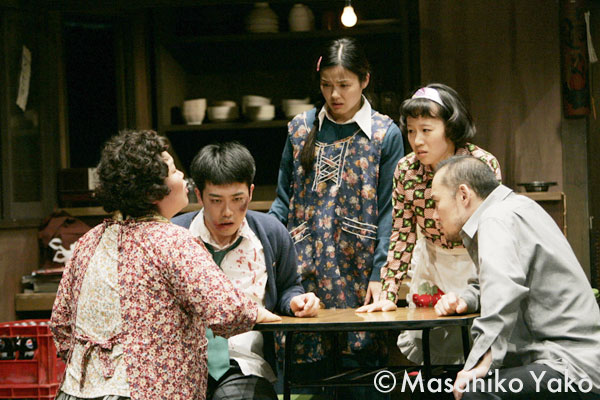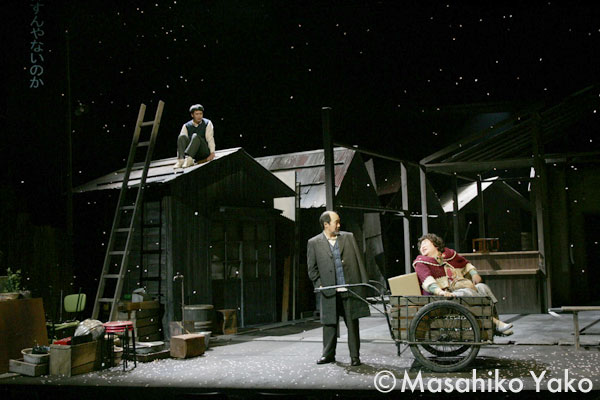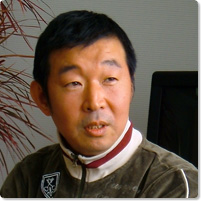The Korean Barbeque restaurant “Yakiniku Dragon” is located in a Korean-Japanese ghetto near the airport without public plumbing.
It is the spring of 1969. At the Yakiniku Dragon, preparations are being made for the wedding party of the owner’s second daughter Rika and her fiancé Tetsuo. The couple is arguing as they return to the restaurant. Rika is mad about the fact that Tetsuo has had a fight with a clerk at the city hall that prevented their marriage certificate from being filed. Meanwhile, her younger sister Mika, an aspiring singer seems to be involved with Hasegawa, who is a club manager. The restaurant owner and father Yong-gil (a one-armed man) and his son Tokio have climbed up on the roof and are watching the scattering cherry blossoms. They seem to have an optimistic view of the future.
It is now summer of the same year. The mother of the family, Yong-sun, is in a bad mood. There is word that they are going to have to vacate the building their restaurant is in, and the son Tokio, after getting in to a good private high school, has not stopped going to school because of bullying by classmates. Since the marriage with Rika, Tetsuo has found one reason after another not to work, and Rika is working to support him while living at the restaurant with her parents. Coming home from work, Rika starts a nasty fight with Tetsuo, accusing him of still being in love with her older sister Shizuka. Tetsuo and Shizuka had been involved before, and seeing Rika’s state, Shizuka takes the opportunity to step out with the Korean customer Dae-su who has stopped by the restaurant. Tetsuo goes out after them. Rika breaks down in tears, but soon she is getting involved with a regular customer named Il-bak.
It is now autumn of the same year. The bullying of Tokio has heated up and finally he has stopped speaking. Then Hasegawa’s wife Mineko shows up and is pressing Mika about her relationship with her husband, the panicked Hasegawa says that he won’t divorce no matter what and then makes a quick exit. Having ridden home on Il-bak’s bicycle, Rika ignores Tetsuo and goes off to bed. Tetsuo tells Shizuka that his marriage is now ruined and he wants to get back together with her. At that moment Dae-su shows up and starts a
makkori
drinking bout with his rival in love.
The scene shifts to the winter of the same year. Everyone at the restaurant is merrily celebrating the marriage of Shizuka and Dae-su. Tetsuo shows up uninvited and announces that he is going to emigrate to North Korea. He pleads with Shizuka to come with him and she decides to accept. Enter father Yong-gil and son Tokio, who had been called to Tokio’s school for a discussion. It turns out that Tokio has failed the school year and will be held back a year. When Yong-gil insists nonetheless that his son must continue to go to that school, Tokio climbs up on the roof, jumps off and kill himself.
It is now the summer of 1970. Now officially divorced, Hasegawa has come to tell Yong-gil that Mika is pregnant and ask for his permission to marry her. In the midst of the general excitement about the coming Osaka World Exposition, Tetsuo is waiting with mixed feelings for the resumption of emigration to North Korea, which had been temporarily suspended by the government. To the city office official who comes to issue the eviction notice, Yong-gil cries, “If you are going to take away my land then give me back the arm that I lost in the war and give me back my son.”
It is the spring of 1971. In front of the former restaurant that has now been reduced to a pile of rubble after the eviction, people are saying sad farewells. Shizuka and Tetsuo are off to North Korea, Rika and Il-bak are going to South Korea, while Mika and Hasegawa are heading off to the bar they have opened. The mother Yong-sun says that even if the family is separated, the family bonds still remain. Tokio appears up on the roof and watches with fond regret as the family goes their separate ways and cherry blossoms begin to fall. Yong-gil puts Yong-sun in the back of his cart and slowly pulls her away up a hill. Was this all a story imagined by the dead?




